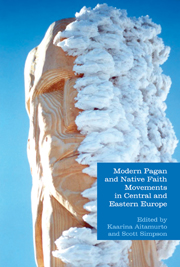Book contents
- Frontmatter
- Contents
- Contributors
- 1 Introduction: Modern Pagan and Native Faith Movements in Central and Eastern Europe
- Part I Overviews
- Part I Country Studies
- 6 Contemporary Paganism in Lithuanian Context: Principal Beliefs and Practices of Romuva
- 7 The Dievturi Movement in Latvia as Invention of Tradition
- 8 Polish Rodzimowierstwo: Strategies for (Re)constructing a Movement
- 9 Ukrainian Paganism and Syncretism: “This Is Indeed Ours!”
- 10 Russian Rodnoverie: Six Portraits of a Movement
- 11 Czech Neopagan Movements and Leaders
- 12 Neopaganism in Slovenia
- 13 Bulgarian Society and the Diversity of Pagan and Neopagan Themes
- 14 Romanian Ethno-Paganism: Discourses of Nationalistic Religion in Virtual Space
- 15 Neopaganism in Hungary: Under the Spell of Roots
- 16 Neopaganism in the Mari El Republic
- 17 A Neopagan Movement in Armenia: The Children of Ara
- Part III Thematic Studies
- Bibliography
- Index
14 - Romanian Ethno-Paganism: Discourses of Nationalistic Religion in Virtual Space
from Part I - Country Studies
- Frontmatter
- Contents
- Contributors
- 1 Introduction: Modern Pagan and Native Faith Movements in Central and Eastern Europe
- Part I Overviews
- Part I Country Studies
- 6 Contemporary Paganism in Lithuanian Context: Principal Beliefs and Practices of Romuva
- 7 The Dievturi Movement in Latvia as Invention of Tradition
- 8 Polish Rodzimowierstwo: Strategies for (Re)constructing a Movement
- 9 Ukrainian Paganism and Syncretism: “This Is Indeed Ours!”
- 10 Russian Rodnoverie: Six Portraits of a Movement
- 11 Czech Neopagan Movements and Leaders
- 12 Neopaganism in Slovenia
- 13 Bulgarian Society and the Diversity of Pagan and Neopagan Themes
- 14 Romanian Ethno-Paganism: Discourses of Nationalistic Religion in Virtual Space
- 15 Neopaganism in Hungary: Under the Spell of Roots
- 16 Neopaganism in the Mari El Republic
- 17 A Neopagan Movement in Armenia: The Children of Ara
- Part III Thematic Studies
- Bibliography
- Index
Summary
INTRODUCTION
In the void left by the dissipating materialistic ideologies in ost-communist CEE, religious movements often mingle with nationalist ideologies. This chapter is concerned with Romanian Neopagan organizations showing an ethnocentric or “Ethno-Pagan” ideology that promotes the revival of specifically Romanian spirituality through a process of reconnection to its ancient, supposedly Dacian and Thracian roots.
Pagan narratives with strong ethnic or nationalistic undertones, with confrontational rhetoric, and representing various levels of organization have an ever more prominent presence in Romanian virtual space. We focused on the similarities and the differences between these religious minorities as mirrored by the Internet and its media. This chapter is an overview which presents Romanian blogs and webpages with pronounced ethnic and Pagan connotations. We also offer a brief overview of the founding narratives and symbolism of various Romanian Ethno-Paganisms as they are displayed on the chosen websites.
At first glance, Neopaganism might seem to be a minor stream even when compared with other new religious movements in Romania. Only a small number of authors have discussed Neopaganism in the Romanian context: as a threat to the religious status quo, as a threat to healthy historical consciousness, as a menace to the social-political order, or as a delirious phantasmagoria contaminating historical, linguistic, and ideological discourse—and these authors either overemphasize Neopaganism's impact or dismiss it out of hand as ridiculous.
- Type
- Chapter
- Information
- Publisher: Acumen PublishingPrint publication year: 2013

